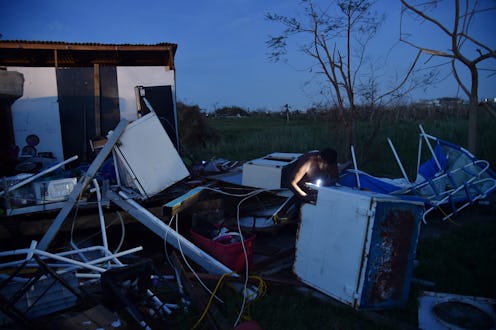News
Congress Could Help Puerto Rico Immediately By Dropping This Obscure Shipping Law

Since Hurricane Maria slammed into Puerto Rico last week, leaving behind extensive damage that has been described as a humanitarian crisis, the U.S. territory has been badly struggling. Trump has come under fire for not doing more to help the island — but there is one simple legislative way to make life easier for Puerto Rico, and that's to kill the Jones Act. So, what is the Jones Act, and how is Puerto Rico affected by it?
The Jones Act is nearly one hundred years old, and has little to no use in the face of this disaster. Back in 1920, following World War 1, Woodrow Wilson signed the Act into law in an effort to ensure that the United States maintained a robust shipping industry. The gist of the law: That only American ships are only able travel from one U.S. port to another to drop off goods and people — any foreign vessels would have to pay extensive punitive fees. Plus, every ship must be the product of the United States, meaning it must be American-built, crewed by Americans, and owned by Americans, according to the New York Times.
So, what does this mean in the present day? Well, very little — if you don't consider the costs incurred for Puerto Rico. Even prior to Maria, Puerto Rico was in bad shape, having been essentially bankrupt for much of the past decade. Having been struck hard by Maria — Trump told reporters that "that island was hit as hard as you can hit," and described it as "literally destroyed" — Puerto Rico needs all the help it can get. An outdated law, designed to bolster American protectionism against foreign countries, is only getting in the way of that.
Should Congress waive or scrap the Jones Act, the effects could be lifesaving. One ugly implication of the Jones Act is that it has damaged trade relations between Puerto Rico and neighboring territories, with goods costing significantly more in Puerto Rico than in nearby U.S. states. If the Jones Act were killed and prices cut, then many more residents of the U.S. territory would have access to affordable foods and medicines.
In addition, according to the Times, Puerto Rico would benefit both long- and short-term as it recovers from the disaster if it were to allow foreign vessels to enter its waters without incurring punitive costs. As former assemblyman Nelson Denis explains in The New York Times:
This industry would generate thousands of jobs and opportunities for skilled laborers and small businesses. On an island with official unemployment over 10 percent (but actually closer to 25 percent), this would energize their entire work force. ... A humanitarian crisis is about to explode in Puerto Rico. But the consequences of Jones Act relief would be immediate and powerful. This is not the time to price-gouge the entire population. It is time for Congress to act ethically and responsibly and suspend the Jones Act in Puerto Rico.
In the aftermath of Hurricanes Irma and Harvey, Congress temporarily suspended the Jones Act to areas affect by those national disasters. As of Monday, however, according to The Washington Post, Congress has steadfastly refused to do the same with Puerto Rico and other areas damaged by Hurricane Maria.
In contrast to his response to Hurricanes Irma and Harvey, Trump has spent relatively little time speaking about the damage wreaked on Puerto Rico. Instead, the president spent much of the weekend tweeting about his belief that athletes who kneel during the National Anthem should be fired. (The kneel protest is specifically in regard to police brutality and crimes against minorities in the United States, not as an expression or a lack of patriotism or otherwise.)